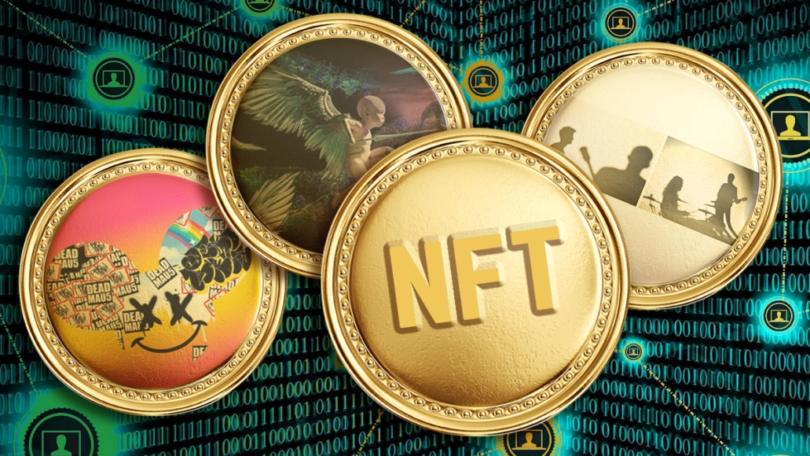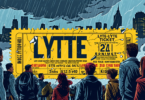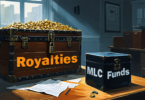Last week, rock band Kings of Leon became the first band to release an album as an NFT, expanding the possibilities for crypto and blockchain technology in the music industry. If that first sentence already lost you, you’ve come to the right place. NFTs are undoubtedly the buzziest new topic in music and for good reason.
In February 2021 alone, NFTs earned nearly 22 million dollars in the music industry, according to data collected by Water & Music, but it’s much like explaining the Internet to someone in the ’90s who has never seen it before. NFTs are highly conceptual and unprecedented, but it makes sense once you get used to the idea.
Consider this article your true introductory guide to NFTs in the music business, wherein, we will break down the most important characteristics of the technology, its potential impacts on the industry (both positive and negative), and which musicians and companies are leading the space.
What Are NFTs?
A non-fungible token (NFT) is a form of cryptocurrency. Think of cryptocurrency as a fancy box that cannot be tampered with or broken into, and within that box, information can be securely placed inside. This box of information can hold just about anything: money, art, music, contracts, essays, etc. Many of us are already familiar with Bitcoin or Ethereum (or we have at least heard those terms float around for the last few years), and for those cryptocurrencies, money is placed safely inside the box.
Money is considered “fungible,” meaning its value is interchangeable with other monies. This means that exchanging Bitcoin is just like exchanging physical cash: a $20 bill can be traded for four $5 bills and a US dollar can be swapped for its equivalent in Mexican pesos. Bitcoin is easy to transfer with something that holds equal value.Related Video Grey Daze’s Sean Dowdell Talks New Album, Chester Bennington’s Legacy, and More
Conversely, a non-fungible token (NFT), which we will focus on in this guide, is anything that is not easily interchangeable that is placed into that box. An equivalent to this in the real world is the Mona Lisa (or any other work of art). There is only one original copy of this painting, and it cannot be replicated no matter what happens.
Someone could try to repaint the Mona Lisa or take a photo of it but that will never mean that it is the exact same as the original. Also, the non-fungible Mona Lisa will not lose value because someone has taken a photo of it or tried to paint it themselves. No one could ever replicate the artist’s signature, the aging of the paint, the specific brush strokes made. All of these unique aspects make the Mona Lisa non-fungible by nature. Trading the Mona Lisa for another famous painting is difficult to reconcile because no painting is of exact equal value to another.
Mona Lisa
In the crypto space, an NFT can be art as well, but it can also be other unreplicable forms, including music, tickets, contracts, and more. That’s where the music industry comes in, using this technology to create unique, sellable pieces of digital merchandise, art work, music and experiences to fans.
But first, what makes crypto so game-changing? Answer: its decentralization and its promise of security. Cryptocurrency was first invented in 2008 with the creation of Bitcoin, and it became revolutionary for cutting out the middleman in finance. In a typical cash system, societies rely on banks and governments to protect their monetary transactions, which can be costly and cumbersome to deal with. In situations like The Great Depression, this can even be dangerous when those institutions fail.
Crypto is different because it uses blockchain technology — a publicly accessible ledger of all transactions with a certain “box.” Each time a transaction occurs, a new block (or, per our analogy, a secure “box”) is created, forming a chain of blocks over time that cannot be tampered with and that get more secure with each block added.
These blocks store important information like time stamps of transactions and who and what has been exchanged. This is much more secure than our current system, which is fairly hackable in the digital age and relies on fallible middle men to control the ledger. In contrast, to hack a blockchain, one would have to alter every single block on the chain, one by one, making it far more impervious than traditional banking. Funny enough, this logic is a lot like a fancy form of “Car Fax”, which acts as a transparent record of all prior use of a vehicle.
Grimes NFT Artwork, photo via Twitter
How Are NFTs Sold?
NFTs can be sold on crypto-marketplaces. Overwhelmingly, music NFTs are sold using an auction or silent auction model (think, a digital form of Sotheby’s or Christie’s), but some are sold at a set price instead. It is up to the seller which method is preferred. Most marketplaces do not accept credit cards or traditional forms of cash and instead ask for cryptocurrencies, but there are a few that accept both traditional cash and cryptocurrency.
Who You Should Know in the World of Music NFTs
One of the best ways to understand music industry NFTs is to look at a few key early players in the space, pioneering music NFTs as their popularity rapidly expands. In fact, sales of music NFTs have reportedly grown 150 times over the last six months, according to data from Water & Music, and it seems that nowadays every artist (and music company) is trying to get in on the hype.
NFTs in the music industry can take on many forms, including but not limited to ticket sales for concerts (virtual and physical), sample packs, previews of unreleased songs, art, and more. With such growth, it can be anticipated that potential uses for this technology will expand quickly and reach far beyond how the industry utilizes NFTs today.

Artists
For artists, NFTs offer the exciting possibility of cutting out some of the industry’s middlemen and monetizing their work in brand-new ways. Mike Shinoda, co-founder of Linkin Park, for example, raised $30,000 auctioning a 37-second teaser of an unreleased song, paired with an animation of a skull as an audio-visual NFT. In a Twitter thread explaining the move, Shinoda noted, “Think of it like owning a 1 of a kind item in a game … It’s a weird thing to own, yes, but: Here’s the crazy thing. Even if I upload the full version of the contained song to DSPs worldwide (which I can still do), I would never get even close to $10k, after fees by DSPs, label, marketing, etc.”
For most established artists with sizable teams, like Shinoda, managers, labels, publishers, co-writers, and more take percentages of the artists’ profits from their music, leaving artists with small fragments of the money their work has earned.
Though electronic artists are the most common early adopters, like top earners 3LAU and Deadmau5, musicians across genres are joining the trend, including the aforementioned rock group Kings of Leon, who dropped the first album ever as an NFT last week.
Released via YellowHeart, an NFT marketplace that counts The Chainsmokers as partners, the group is not only offering the album itself as an NFT; it also offers digital artwork and six “golden tickets,” all as NFTs. If a fan gets the golden ticket, they can redeem “four front-row tickets at any Kings of Leon headline show, anywhere in the world, once per tour.” In this case, the NFT’s blockchain technology allows for a secure transfer of the golden ticket directly into the fan’s digital wallet.
The album NFT itself will be available for purchase for two weeks, and it will include digital album artwork, one full digital album download, and a physical copy of a limited-edition vinyl.
This also opens up possibilities for producers. Grammy-nominated producer Illmind recently offered up the world’s first sample beat pack as an NFT, announcing it via Twitter on February 25th.
Anyone can listen to the beat pack, but ownership and the rights to use the pack only go to the highest bidder. This sale in particular could have a major impact on the way music is licensed and sold. Currently, licensing music or transferring ownership is an inconvenient process for labels, publishers and their lawyers, often resulting in pushed-back release dates as people work to manually clear each sample use or transfer of ownership. With NFTs, it is as quick as buying just about anything else online, and the technology allows for clear documentation of the transfer. Editor’s Pick
Music Industry Companies
Andrew Gertler, manager of Shawn Mendes, partnered with the popular creative direction agency STURDY (best known for work with Drake and Travis Scott) to launch a new NFT marketplace called STURDY.Exchange, focused on music NFTs, one of the first to do so. Gertler and Mendes, prior to the announcement of STURDY.Exchange, forayed into the NFT market by selling exclusive accessories, like a digital version of Mendes’ signature guitar with Fender, for Genies avatars.
Creative studio, label, and management company IAMSOUND partnered with label 88Rising and crypto marketplace Zora to launch the first NFT art exhibition on February 26th, 2021 with Toro y Moi, Yaeji, and Mura Masa. One of the top-selling art pieces, Yaeji’s digital pet fish, was sold for the equivalent of $27,000.
Warner Music Group has been a supporter of NFTs for years. In September 2019, long before the current hype, WMG’s Innovation and Emerging Technology department invested in Vancouver-based Dapper Labs, the creators of CryptoKitties. Cryptokitties, a game that allowed users to trade and sell virtual cats. This was the first example of a non-fungible token, and a year after the investment, WMG partnered with Cryptokitties and Warner-signed artist Muse to create two limited-edition cat NFTs inspired by the band.
Muse and Cryptokitties
Why Would Anyone Want to Buy an NFT?
Although some of the NFTs being offered today might feel frivolous, the logic of buying NFTs is similar to other physical goods. For example, many fans might want to buy a limited-run collector’s edition vinyl even though they can stream the same album for (almost) free. The popularity of NFTs also fits the trend of hype-driven brands like Supreme. There is nothing particularly special about a Supreme T-shirt, but it is special because it is something that not many others have. The rarity of Supreme, a collector’s vinyl, or an NFT makes it a status symbol and keepsake.
Others might buy NFTs as investments, hoping that someday in the future their NFT will retain or appreciate in value, and it can be sold for a profit. This is a bit riskier than purchasing something because of its cool-factor, but for many customers, buying an NFT is a mix of both.
Pros of NFTs
Alternative Revenue Streams for Artists: COVID-19 has left the music business in disrepair. After losing the industry’s most profitable sector, live music, almost entirely for the past year, many artists and companies have struggled to continue. NFTs offer a potential new form of revenue to compensate for that loss, and it provides a rare opportunity for fans to support artists directly.
Intellectual Property: As seen with the Illmind sample pack, NFTs could create a much easier, quicker, and more secure transfer of ownership of intellectual property like songs, recordings, and samples than the current model. The transfer of ownership via blockchain can be recorded by “smart contracts” and processed within seconds. (Please see the Cons section for more on Intellectual Property)
Ticketing: Ticketing for live and virtual events has been dogged by inefficiency, bots, scalping, hidden fees, and counterfeits for a long time. According to CNBC, 12% of people buying concert tickets get scammed, but the blockchain technology used to power NFTs makes scamming nearly impossible, allowing for much more clear transfers of ownership and easier verification. NFT ticketing (or “smart ticketing”) can also prevent secondary sales markets and scalping. Where resale and scalping is forbidden by the ticketing company, smart tickets can be made non-transferrable in its computer code to prevent the transfer of tickets.
Illmind’s Alorium Sample Pack
Cons of NFTs
Emerging Artists: So far, there are not many emerging artists who have tapped into the NFT market. Because NFT sales are often driven by status and hype and not by merit, it stands to reason that emerging artists would not fare well. Also, some marketplaces are highly curated and exclude NFTs from smaller names, but marketplaces, like OpenSea.io, for example, that are open to emerging acts, charge a hefty up-front fee to set up your account as a buyer, creating a barrier of entry.
Manufactured Scarcity: Digital scarcity and physical scarcity are quite different in nature. A live show with a seating cap is an example of scarcity in the music industry that is physically necessary, but a livestream show with a limited number of tickets sold as NFTs creates scarcity that did not need to exist otherwise. More fans could have attended the livestream if the artist allowed it. NFTs rely on the manufactured concept that something is limited when it is not to make it appear valuable, and although this exclusivity brings in higher price tags at marketplaces, it excludes many of the artist’s fans when it was not necessary to do so.
Bubble Trouble: Could this be the new dot.com bubble? Are we over-valuing what these non-fungible tokens are because of their current trendiness? If the prices of NFTs sold are based on hype and manufactured scarcity, waning interest could prove dangerous for those who have purchased NFTs as investments.
Intellectual Property: Though recent cases, like Illmind’s sample pack NFT, have proved the potential benefits of using blockchain to transfer ownership of intellectual property, there is still a lot of uncertainty. Given the newness of the technology and the complexity of copyright laws worldwide, smart contracts in a decentralized system could easily run into issues.
Source: Consequence Sound







